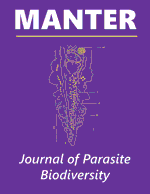Parasitology, Harold W. Manter Laboratory of

MANTER: Journal of Parasite Biodiversity
ORCID IDs
Date of this Version
12-23-2022
Document Type
Article
Citation
MANTER: Journal of Parasite Biodiversity (December 23, 2022) number 27
doi: 10.32873/unl.dc.manter27
Abstract
Pathogens and their hosts are embedded within the larger biosphere, what Darwin called the “entangled bank.” Emerging infectious disease occurs when a parasite “switches” to a new host. Understanding the dynamics of emerging disease requires understanding the dynamics of host-switching, which requires a more general understanding of how the biosphere and its constituent members cope when conditions change. The Stockholm paradigm is an integrative evolutionary framework that describes how living systems cope with change by oscillating between exploiting and exploring the geographical and functional dimensions of their environments. It combines organismal capacity, ecological opportunity, and the repeated external perturbations to the conditions that drive the interaction between capacity and opportunity, catalyzing the dynamics of the entangled bank. The Stockholm paradigm makes clear that emerging disease is an expected outcome of the expression of the same evolutionary potential that governs the response of the rest of the biosphere when conditions change.


Comments
Copyright © 2022, Agosta
License: CC BY-NC-SA 4.0 International